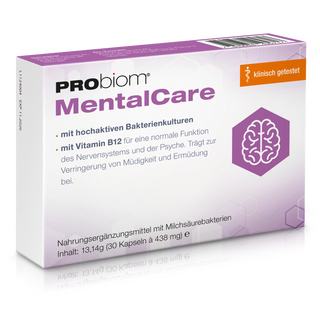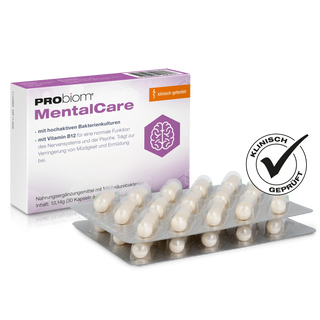Stress is a part of modern everyday life, but when it becomes chronic, it can have significant health implications—especially on the digestive system. Many people suffer from stress-related digestive disorders, which manifest themselves in symptoms such as bloating, diarrhea, constipation, or stomach pain. But how does stress affect the gut, what role does the microbiome play, and how can targeted probiotics such as Lactobacillus helveticus Rosell®-52 and Bifidobacterium longum Rosell®-175 help?
How stress affects digestion
Stress activates the sympathetic nervous system, also known as the "fight-or-flight" response. In stressful situations, digestion slows down because the body needs its energy for other tasks. However, if this condition becomes permanent, various digestive problems can develop:
-
Irritable bowel syndrome (IBS): Chronic stress is often associated with IBS, which is characterized by abdominal pain, bloating, and irregular bowel habits.
-
Stomach pain and heartburn: Stress can affect stomach acid production and lead to reflux or gastritis.
-
Diarrhea or constipation: Stress hormones can either speed up or slow down bowel movement, leading to diarrhea or constipation.
-
Flatulence: Impaired bowel function can lead to increased gas production, which manifests as flatulence.
The role of the gut microbiome in stress-related digestive disorders
The gut and brain interact closely via the gut-brain axis. A healthy microbiome helps regulate stress hormones, reduce inflammation, and strengthen the intestinal barrier. However, chronic stress can disrupt the balance of gut flora, leading to an increase in harmful bacteria and a decrease in beneficial microorganisms. This, in turn, can exacerbate digestive problems and impair overall well-being.
How Lactobacillus helveticus Rosell®-52 and Bifidobacterium longum Rosell®-175 can help
Certain probiotic strains have been shown to be particularly effective in treating stress-related digestive disorders. These include Lactobacillus helveticus Rosell®-52 and Bifidobacterium longum Rosell®-175 .
-
Reduction of stress and anxiety: Studies show that these probiotics act via the gut-brain axis and can positively influence the production of stress-related neurotransmitters such as cortisol.
-
Improve intestinal function: They help strengthen the intestinal barrier and reduce inflammation, thereby relieving digestive discomfort.
-
Balancing the intestinal flora: Both strains promote the growth of beneficial intestinal bacteria, which contributes to better digestion and a more stable immune system.
-
Relief of IBS symptoms: Especially in people with irritable bowel syndrome, these probiotics can help reduce bloating, diarrhea, and abdominal pain.
Stress management tips for healthy digestion
In addition to taking probiotics, there are other measures that can help relieve stress-related digestive problems:
-
Eat mindfully: Eating slowly and consciously promotes digestion and reduces stress.
-
Exercise and relaxation techniques: Yoga, meditation or walking reduce stress levels and promote intestinal health.
-
High-fiber diet: A balanced diet with plenty of vegetables, whole grains, and fermented foods supports the microbiome.
-
Sufficient sleep: A regular sleep-wake rhythm contributes to the regeneration of the digestive system.
-
Hydration: Drinking enough water helps regulate digestion and prevent constipation.
Conclusion
Stress-related digestive disorders are widespread and can significantly impact quality of life. A healthy gut plays a crucial role in managing stress, and targeted probiotics such as Lactobacillus helveticus Rosell®-52 and Bifidobacterium longum Rosell®-175 can help balance the gut flora and relieve digestive problems. Combined with a healthy diet and effective stress management strategies, this can lead to a noticeable improvement in well-being.













